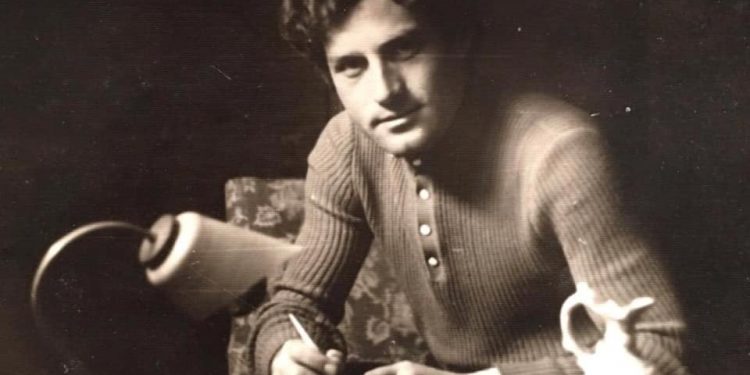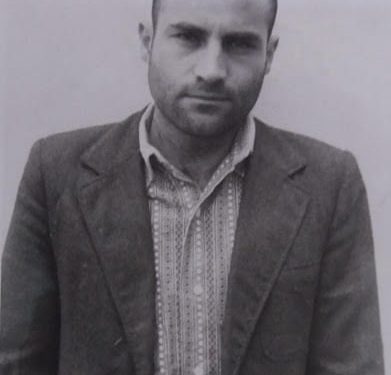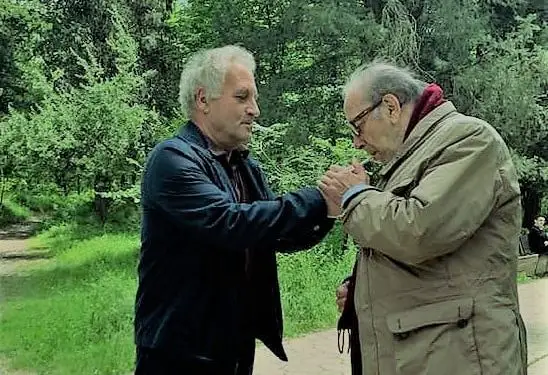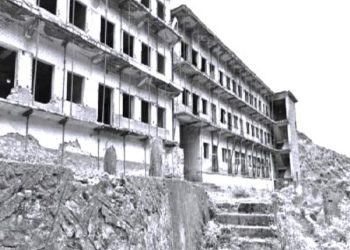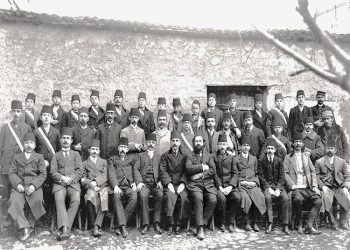By Fatbardh Amursi (Rustemi)
When Pegasus turns into a battle horse
Entry
Memorie.al/ The triptych of this article, which could have the subtitles: “to go to jail for poetry”, “to see through a wound” and “to win over evil with poetry”, was written by friend for friend, Fatbardhi for Visar. The two grew up in the same town, in small Lushnja, with a large class war then, where in the suburbs began the villages of internment.
Visari and Bardhi were from the same neighborhood, went to the same school, and even stayed on the same bench until they finished high school. They liked poetry and started writing. But the fates would then be different, even opposite. While Bardhi was sent to study literature at the University of Tirana and became a high school teacher, Visar managed to go to Shkodra to study literature, because he “had a biography” against the regime, but he shot in the few years of liberalism, as they were called and to be punished immediately…!
And here the paths of two friends of the same bank are divided. Visar would be arrested for his poems and sent to prison; the court gave him 10 years in prison, depriving him of the right to publish and the electoral, if he was released, while Bardhi would continue with the publications, from poetry to comedy, putting them in different scenes, etc.
Visar has shown with his later books his ordeal, mention and close friendship with Bardhi in his early youth, but it is interesting how Bardhi now sees what happened to his friend, the anti-visar time…!
The triptych begins when the two were in two different mines, Bardhi was taken with creative permission to the socialist mine of Pishkashi, to know the working class and to write, while Visar is in the mine of Spaç prison, convicted as an enemy, who secretly writes poetry as a prisoner.
Truly a special essay, written in a friendly way, that makes you discover, no matter how little, the times, the mindsets, the changes, the divisions, the unions, and to feel more than being friends, the poetry of life, must be stronger than regimes and are acts that face forgetfulness…!
Author
To know the socialist reality, the Writers’ League gave us creative permission. I was assigned to the Red Stone mine, where I had to be inspired by the heroism of the miners. At the Spaç mine, Visari was serving a 13-year prison sentence. Guess what: character gallery, art gallery. In the labyrinths of the mine, I met a miner, who with a jackhammer dug holes for dynamite molds inside a cave. (The inventor of dynamite is the Nobel, which also bears the name “Nobel Prize”. Kadare longtime candidate).
The miner was explaining the layers of the earth to me, as it seemed to me, as if I were learning lessons from the oracles of antiquity: “This layer here,” he told me, . This here, before it collapses, throws a pebble, as a warning, like the swaying man to whom you must beware. “While this layer here suddenly catches you, like the wicked, to eat behind your back.” I wanted to write about him, drawn from the philosophy of explaining characters from the horoscope of earth layers, but, days later, I learned that the dynamite in the gallery had taken his life.
Writing about workplace accidents was like joking around with handcuffs. Both the miner and Visar suffered from “treacherous soil”. I do not know why I remembered Faslli’s poem “Mud up”?! I was between the slain hero and the doomed poet. The purpose of creative permission: to know life, but, the underworld was a taboo subject for the time. “How difficult it is to begin to know the sky when they seize the right to look at it.” – says pure spirit, Voltaire’s character.
The event takes place at the time of the Inquisition, when the telescope was being called the work of the devil. “Open horizons” were preached (there is also a movie with this title), pulling our arms. You cannot find anything more paradoxical from an isolated place, which boasted of “open horizons”, where the flight of birds in the open sky, was taken for granted and for the people, who were dragged away. The first to suffer were the dreamers. “We dreamed of freedom and we became a dream ourselves” – the poet Zhiti will write.
The underground world of crime, hidden in the “house of leaves”, in tunnels and backstage was changed to BunkArt, is also expected in SPAK, but the denunciation of the crimes of communism can be found in the burgology, “Cards of convicted realism” by Visar Zhit , of course, and of other authors, whom I retaliate only with books. Visari, exploiting the cracks of hell, where he discovers the treasures of fear, in an endless funeral, from the torn suitcase throws a skull at our feet, thanks to the memory of the air, where lightning is planted. Through the titles of the books you can also find the author’s itinerary, otherwise known as calvary.
To open a tunnel, work from both sides. I do not know if this figure is appropriate, if we see the literature of socialist realism and the literature of the prison as complementary to each other, or should they be confronted to keep alive a fire, where instead of witches, it is Jordano’s turn again. Brunos? But
also for witches, Salman Ruzhdie has an interesting approach: “When the first witches were burned in the fire, it was easier to blame them than to question the justice of their burning.”
An unjust time cannot be countered with other injustices, but by taking revenge on the master. Didn’t you get tired of taking revenge on each other? “People find new ways to oppress others, new ways to undo the best achievements of others”, – Salman Ruzhdie sensitizes us, sharpening our senses.
In the mine we were both, childhood and youth friends, who had embarked on the path of poetry together, already separated: me with creative permission and Visar, a political prisoner. Was not on the one hand the free spirit and on the other the repressed wills? Weren’t we also divided in the path of literature: he in “condemned realism” and I in “socialist realism”? (From 1972 to 1985, two years before Visar was released from prison and 4 years before the fall of the regime, I could barely publish the book of poems “In the Clarity of the Eyes”, captured with wires and not with a pen, which resembled me with the skeleton of the fish, which old Santiago of Hemiguej brought ashore.
“The book is good as it is and not as you want it to be,” Kadare would tell Faslli Haliti, the book’s editor. Hardly anyone has escaped rounding, squaring to be inside. Visar, drawn by the “bow of triumph”, refused to put his head on the collar. “What should be done to save poetry from the wooden measure of weakness?” – he writes in the poem “The Flint Tower”, which the editors wore in his ear and marked in the indictment. Life brought him not to belong: neither to the “literature of socialist realism” nor to the “prison literature”. (So I have no conflict of interest in dealing with them.)
The voluminous book “Cards of Condemned Realism”, called by Visar as “prison literature” lists all the authors who, instead of decorations: had wounds. Are “biography spots” turning into tattoos? When Visar refers to the literature of socialist realism, the cards are empty, without names. Whereas, Agron Tufa, without hesitation, completes the cards with concrete names, describing the literature of socialist realism as “morgue literature”:
Such novels of this street are: “Liberators” by Dh. S. Shuteriqi, “They were not alone”, by S. Spases, “Before dawn”, by Sh. Musaraj, “Fields on the Mountain”, by P. Markos, “Dead River” and “White South”, by J. Xoxa (respectively parallels of two novels by M. Shollohov “Quiet Love” and “Cracked Lands” ), “A stormy autumn”, by A. Abdihoxha (parallel to “New Guard” by A. Fadajev), “Again on foot”, by Dh. Juan (parallel to N. Ostrovsky’s “How Steel Was Tempered”), “Commissar Memo”, D. Agoll (see D. Furmanov’s “Capajev” and some other Soviet social realist novels on war), “Coping”, of T. Laço (see “Bread” by Alexei Tolstoy), “Discovery”, of A. Kondo (see “Cement” by F. Gladkov) etc., etc., endless “.
Tufa’s finding of the influence of Soviet literature remains, although many Soviet writers were under the influence of Western art, including Mayakovsky. Even when it broke with the Soviet Union, even when the bourgeois-revisionist influences were fought, the influence of Soviet literature was allowed, it became a blind eye. Defending Stalin also protected Zhdanov, the creator of the method of socialist realism, accepted at the first congress of Soviet writers, where Pasternak was in the rostrum with Gorky. (Meanwhile, Kadare was published in the West, moving upstream.)
Tufa’s statement, referring to the above examples, is not insulting, but the conclusion: “mortuary literature” is exaggerated, not to say: a Mephistophelean nihilism. By participating in the funeral of the “literature of socialist realism” it is implied that the literature of survival, that of prison, has overturned the hierarchy of values. It is no coincidence that attacks on Ismail Kadare has become more frequent. Sit down and let the moon rise?! (The `60s have gone down in history as the war between anachronistic poets and innovators.
Enver Hoxha hurried to extinguish the bloodshed, keeping the side of the youth, despite the fact that he had eliminated the “Communist group of youth” with terrorist methods, because the clash of writers showed the symptoms of “generational war”. However, it was the anachronists who added to the ranks, as the guardians of the method of socialist realism, while the innovators rarely got in the way: they were kept under the pressure of possible error, often accused of violating the principles of the method, no positive hero was said about Kadare’s novels, etc.
In fact, innovators were caught between two fires: yesterday’s anachronists and today’s modernists. Literature is a whole, as it has only one dimension: its value. It was up to Visar to close the path of misunderstandings, as a promoter of “prison literature” and he did so by staying true to the verse: “My only trick is curls.”
Visar was guarded by the guards; I was in the ambush of editors and reviewers, where the manuscripts were locked in drawers. It was the same path that led to the cell. However, the guards could not stop Visar from riding Pegasus, the flying horse. Here is how: “I looked into the horse’s eyes / (Pegasus) … I was shaved brick, dirty and with a beard … / I avoided / so as not to look like a wild horse.” (Shaving brick is fashionable today. Most artisans wear beards, where Pegasus is apparently rented.)
I believe it arouses interest to know: Did Visar go to prison as a poet (27 years old), did the prison make him a poet (35 years old) or was he crowned in democracy as such? (He published the poetic book “Kujtesa e ajrit” in 1993, at the age of 41). If he were not a successful poet, prominent in the literary press of the time, I am convinced that he would have had another fate. It is talent that evokes lightning. The title of the manuscript “The Rhapsody of the Life of Roses”, which was held hostage in the Publishing House, is meaningful, if we refer to the “socialist spring”, but stuck in the drawers of the editorial office for 7 years 1972-’79, as much as the years of sentence of the author 1980-1987, explains a truth, which I want to share with the public.
The literary press, the newspaper “Drita”, the magazine “Nëntori” or the newspaper “Zeri i rinisë”, where poems or poetic cycles were published, promoted talents. They became famous before even going to the book. Talent is trouble. When they went to the Publishing House to publish books, there: there were craftsmen to do the “leveling of values”. Even one or two or three people crossed the border, and not a herd. Why did the manuscript and not the poems published in the literary press have an influential power, where the editors’ expertise was more valuable than Dritero’s public assessments of Visar?
Among those who put him in prison, not only witnesses should be counted, including investigators, there are many others in front of them, who gave considerations, formed opinions by digging into the obscurity of metaphors, follow instructions or notes on the side of the sheet. It was precisely being a poet that the creative process did not stop even in conditions of deprivation with the guardian over his head.
“With 94 poems in my head, as much as it seemed to me that I was looking at them, I also knew the verses as they were placed in the air, with the hostage that I could not make 100, they took me to Spaç prison, where a close friend of mine, a Cham Bajo, I call him in the book, we had been students together, I dared to tell him, I muttered to him in the dark, he encouraged me to write them, those and others and he and other friends helped me to hide them, in mattress straw, in sacks, between clothes or any food, which was allowed in prison, etc., etc. I was lucky and I got out of prison all my poems … it is the merit of my family, of their sacrifice “.
This whole story is creepy, as the roses had fallen and rhapsody had remained, at the same time something divine, where the creative soul, without the help of a sheet and a pen, had to create in secret. To understand that time: the bad became even worse: “and thrown” and the good became even better: “a good place to set up a masjid “. Political differentiation escalated moral polarization.
If Visar had ridden the flying horse, Pegasus, I would have saddled the “battle horse”, scoring no victory. Both he and I: in relation to time: we remained cavalier. If you wanted to be inspired, with the permission of the state you went to the mine with grace, and if you had to be punished for wrong creativity: you inadvertently went to the mine. (Dante visited hell in Virgil’s company. The opposite did not happen that Dante accompanied Virgil in the real world.) / Memorie.al
Continues in the next issue




